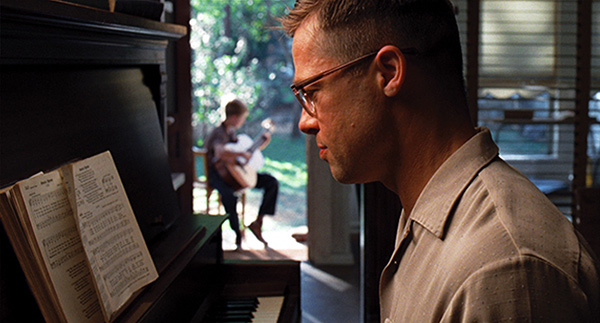Subtotal: $
Checkout
The Mysterious Barricades between Fathers and Sons
Filmmaker Terrence Malick finds a musical expression of the father-son dynamic in François Couperin’s rondeau “Les Barricades Mystérieuses.”
By Joel Clarkson
June 15, 2024
The Plough Music Series is a regular selection of music intended to lift the heart to God. It is not a playlist of background music: each installment focuses on a single piece worth pausing to enjoy.
Father’s Day offers the opportunity to reflect on the way the relationships between fathers and their children reveal something of our shared identity as children of God. Human fatherhood gestures to the eternal, ineffable God who has graciously made himself known to us. Our fathers have the capacity to reflect in their lives that divine source that grounds us in safety, belonging, and the very experience of being known and loved.
And yet, even in the best of fatherly relationships, there is a strange chasm of otherness. The late poet John O’Donohue poignantly observed that to know one’s father, one must set out from the initial comfort and belonging of one’s mother to encounter the other in one’s father. This is especially a challenging journey for sons, who, to learn the meaning of their existence as men, and the possibility of someday taking up the mantle of fatherhood themselves, must “journey outwards, across space to find the father…. Regardless of how open, loving and gentle the father is, the child can at best only draw alongside an enclosed world.”
Terrence Malick’s 2011 film The Tree of Life encapsulates this reality in a powerful way through the fraught relationship between a father and his son in mid-twentieth-century Texas. The father is a good man who loves his family, but seems to single out his son Jack, holding back his kindness and instead imposing his will. In contrast, Jack’s younger brother R. L. is a gentle soul who has a natural and unquestioning relationship with their father. As we are ushered into Jack’s inner narrative, we begin to understand how this creates a deep pain in Jack and prompts him to question the very goodness of the world around him.
In one scene, Jack’s father, a lover of classical music, plays François Couperin’s rondeau “Les Barricades Mystérieuses” on the family piano. It’s a beautiful day, and outside on the porch, R. L., who has been noodling on a classical guitar, has been listening to his father’s music. To his father’s astonishment, R. L. repeats back a phrase just played on the piano. For an exquisite moment, the two begin an impromptu duet, the music drawing father and son into a quiet unity. From the yard, Jack watches on, unseen in more ways than one, the beauty of one son’s connection with his father provoking loss and bewilderment in the other.

Photograph by Photo 12 / Alamy Stock Photo.
Couperin’s piece is the perfect accompaniment to the enigma of the scene. The composer never explained what “mysterious barricades” may be encapsulated in the title of the piece. The music itself, constructed around a warm, meditative ostinato, dips in and around the initial theme, traipsing out into lovely interludes, only to draw the listener back into the embrace of the initial motif. Again and again, the piece casts its listeners into this gamboling call and response, tilting them toward the sublime and then pulling them back at the last moment.
In a sense, fatherly relationships are a unique living expression of that relentless dance between our experience of the imperfections of the world we live in and the longing we all have to overcome the “barricades” that keep us apart and find communion with each other. It is indeed comforting, then, that every fatherly relationship is held within the grace of our eternal Father who has journeyed across the infinite expanse to meet us. The Father never withholds himself from his children but instead draws them into the joy and abundance of his limitless life.
Below, Alexandre Tharaud performs “Les Barricades Mystérieuses” in the Hall of Mirrors in the Palace of Versailles.
Already a subscriber? Sign in
Try 3 months of unlimited access. Start your FREE TRIAL today. Cancel anytime.






